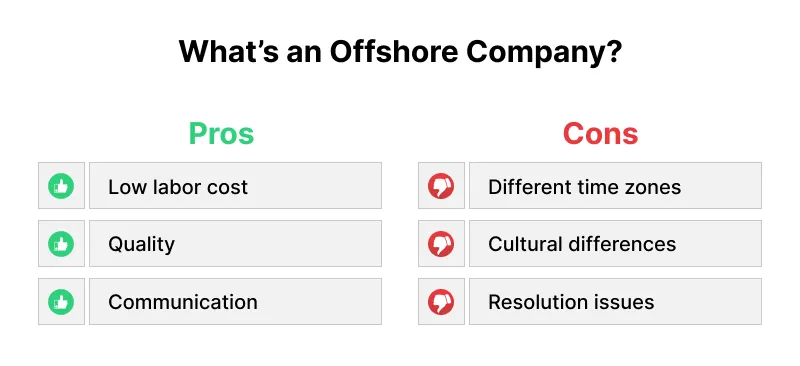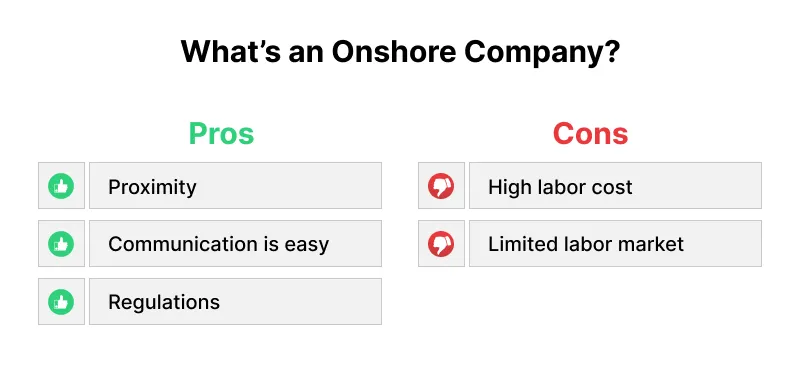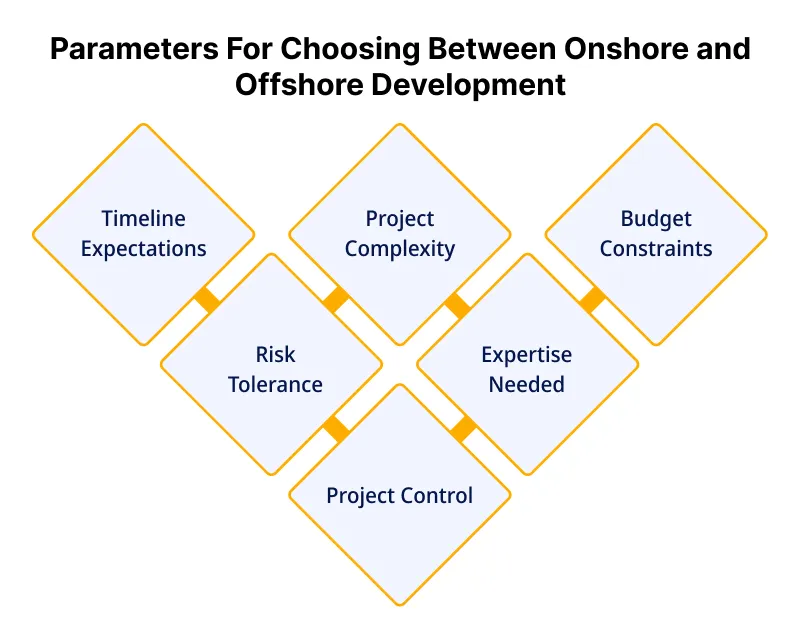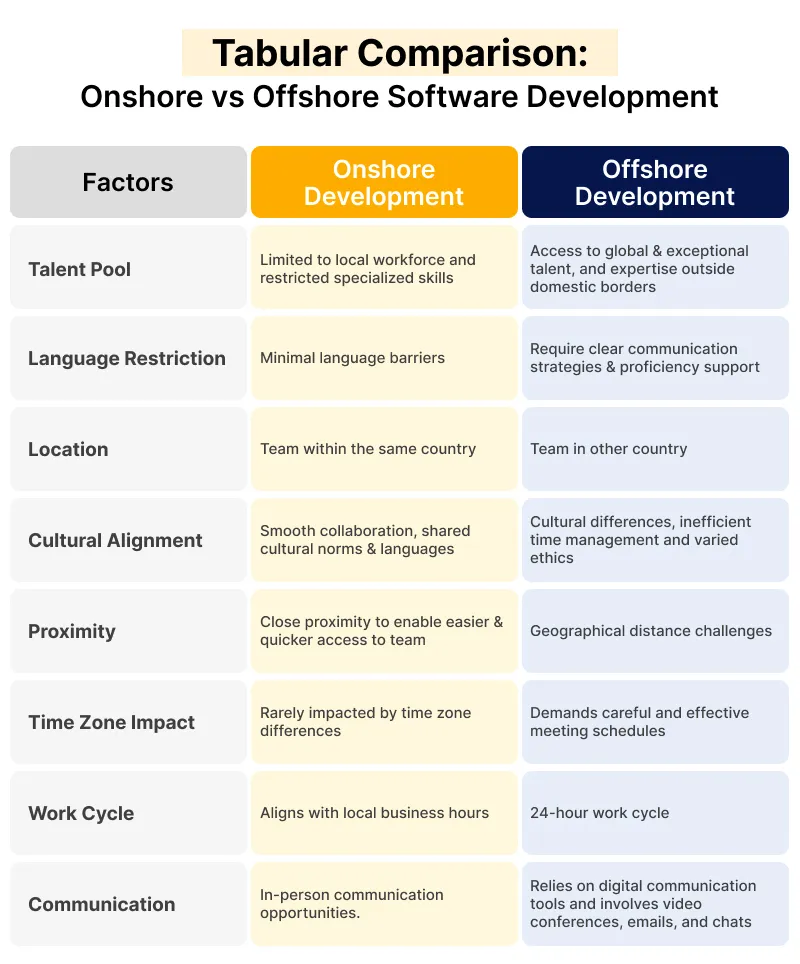Do you have an app idea? Is your in-house team lacking the required expertise to turn your vision into reality?
If yes, then this blog post is for you.
Software development outsourcing is going to grow by 70% in 2024. Outsourcing projects has become the new norm when it comes to software development. This trend is quite prevalent today as companies wanted to focus on their core business necessities.
In fact, offshore vs onshore outsourcing has become the way to go to execute more significant projects. This blog post will help differentiate between onshore vs offshore outsourcing, including the pros and cons.
Before we proceed, let’s decode the difference between offshore vs. onshore teams. Both onshore and offshore companies are very much capable of doing the same task.
But the primary difference is what the dedicated time taken is? What is the associated quality of work and application development cost?
What Is An Offshore Company?
An offshore company refers to an entity/firm that takes part in offshoring activities. Many businesses in the United States looked into the difference between offshore and onshore companies and started outsourcing their services to offshore companies, considering the low wages.
For companies abroad, it is quite difficult for them to sublet work to domestic professionals. Hence, it is always a prudent idea a sense of comfort, and outsourcing services to an offshore company.
This way, you can find knowledgeable, skilled, and English-speaking workers worldwide in countries like India, the Philippines, Eastern European countries, or even Mexico to outsource projects to leading software developers in India for maximum output.
Pros
- Low labor cost: The most significant advantage of outsourcing an offshore company is comparatively the lower cost than hiring domestic workers.
- Quality: Offshore companies are skilled workers rendering quality services meeting all specific requirements.
- Communication: Offshore companies always remain in touch via a virtual medium i.e. phone or email, common in pandemic times.
Discover the cost benefits of offshore vs onshore teams.
Cons
- Different time zones: Working with an offshore company often means dealing with different time zones. As a result, you may experience delays in communication.
- Cultural differences: You may experience cultural differences while dealing with an offshore company. The language barrier is not uncommon, either. Even if they speak English, they may not be their native or first language. Therefore, be careful while passing out instructions to avoid coming out as offensive.
- Resolution issues: It is always easy to resolve a domestic company problem. Dealing with a foreign court can have some issues; however, this can be quite expensive and tedious.
While it may be easy to solve a domestic company’s issue, offshore companies cannot say the same. You will have to deal with a foreign court if you have an issue with a foreign worker, which can be an expensive and tedious process.
Related Blog: Why Outsourcing Is Important For Startup Product Development?
What’s an Onshore Company?
An onshore company is an entity incorporated in a home country with the sole purpose of doing business within that specific jurisdiction. In case offshoring is not an option or appears feasible.
You can choose to outsource your software product development services to companies located in your local country. You may have to spend more money in terms of labor costs, but the benefit of this is that you are working with local workers. That means there is no such language barrier or cultural differences to deal with.
Pros
- Proximity: The first advantage of hiring an onshore company is that they are close to your business. That means it can be easier for you to monitor the projects you have outsourced to them.
- Communication is easy: The best thing about working with an onshore company is that you have the leverage to communicate in the same language. Therefore, you can understand each other very well, with no zone complications.
- Regulations: Dealing with an onshore company means that you are both governed by the same rules. Therefore, it is easy to tell if the onshore company does not comply with your country’s laws and regulations raise the alarm.
Gain insights into offshore vs onshore team expenses.
Cons
- High labor cost: Domestic workers usually command a high rate for offshore companies’ same services. That means you have to spend more money while working with an onshore company.
- Limited labor market: When hiring domestically, you limit yourself to just one geographic region when searching for talent. Using an offshore company, you pull from multiple geographic areas and ensure that you are getting the best talent available.
Factors to Consider When Choosing Between Onshore and Offshore Development?
Offshore vs onshore software development both carry a unique set of their own benefits. However, to make the right decision, it becomes important to consider a few parameters before going for one:
1) Timeline Expectations
Offshore development has the potential to complete projects faster. On the other hand, onshore development follows local working hours and ultimately leads to project progression.
- Ability to leverage 24-hour work cycle in offshore development.
- Longer timeframes for project completion in onshore development.
2) Project Complexity
In offshore development, digital communication can lead to delays in understanding complex details. However, for projects with intricate details & constant iterations, onshore development holds a good advantage.
- Time-zone differences can hinder quick decision-making in offshore development.
- Direct communication minimizes the risk of misunderstandings in onshore teams.
3) Budget Constraints
Offshore development is more suitable if budget optimization is your first priority, as it comes with lower labor costs. However, onshore development tends to be more expensive because of many factors like operational expenses etc.
- Enables more flexibility within budget constraints in offshore development.
- This might limit flexibility due to budget constraints in onshore development.
4) Risk Tolerance
There are minimum communication misunderstandings, time zone challenges and cultural discrepancies in the case of onshore development. On the other hand, there is a risk of language barriers & potential miscommunication in offshore development.
- Cultural differences might impact project understanding in offshore development.
- Overlapping time zones eases down real-time interactions in onshore teams.
5) Expertise Needed
In onshore development, there is restricted access to talent in the local region. However, offshore teams offer access to a global talent pool beyond geographical areas and also ensure you find experts with accurate skills your project requires.
- Specialized experts with specific expertise in offshore development.
- Skill limitations may compromise on quality in onshore development.
6) Project Control
You have direct control and real-time oversight in onshore development. It also provides immediate access to the software development team. It is good for projects where you want to monitor progress. In offshore, project management efforts are required to ensure alignment.
- Distance can lead to delays in communication & decision-making in offshore teams.
- Face-to-face interactions enhance project alignment in onshore teams.
- Tabular Comparison: Onshore vs Offshore Software Development.
This table is created to show differences between onshore and offshore development based on some parameters listed in the same.
Now, the choice between offshore and onshore software development is a delicate balancing task. Onshore software development provides swift communication and direct control over projects.
On the other hand, offshore software development allows you to leverage a diverse global talent pool and venture into international waters. The attractive thing about offshore development is that it leads to potential app cost savings.
Also Read – Offshore vs Nearshore Outsourcing: A Detailed Comparision
Cost Structure Of Hiring Experienced Developers
Hiring an experienced developer in the US/UK/Europe business startup costs upwards of $100,000/annually, including salary and other benefits. A similar resource from India would cost around $20,000.
This is the one-fifth cost of hiring in-house teams, so it makes more business sense to hire a team of developers working offshore at the expense of a single developer who works in-house.
Not all offshoring saves on the following additional startup costs:
According to Indeed, the average software developer in the US is $95k.
Advantages of hiring offshore teams:
- Offshore teams work with best-in-class infrastructure and technology.
- The latest cloud tools are proving to be simplified management—online tests in hiring quality resources.
Disadvantages of hiring in-house teams include:
- One has to comply with employment regulations.
- Employee compensation and benefits have to be paid to in-house teams.
- The infrastructure and space costs of hiring in-house resources are much higher in the case of on-shore groups.
Explore offshore vs onshore team costs.
Why Choose ValueCoders as Your Offshore Software Development Company?
The offshore outsourcing companies offer a dedicated project manager to ensure the timely delivery of projects. Most IT organizations that outsource their services to offshore companies say that their software development cost has been lower than hiring in-house resources.
Outsourcing Cost Success Rate_1Businesses looking to hire expert offshore teams must choose a professional agency like ValueCoders for:
- Hassle-free and quick hiring
- Non-disclosure agreement
- Timely project delivery
Final Note
Offshore and Onshore work are the two aspects of executing business. Both have their own gray and dark spots. Does it depend on your project requirement on how it works?
When globalization is squeezing the business channel, both modalities complement each other. This is why offshore development projects in India are peaking new when tackling years, perhaps the most challenging time.
So don’t leave your guard to seek services from firms like ValueCoders. Hire dedicated developers from them to get your future projects done with ease.










